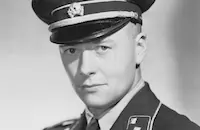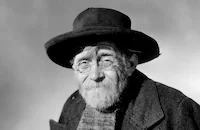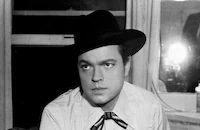Swiss Family Robinson
Brief Synopsis
Cast & Crew
Edward Ludwig
Thomas Mitchell
Edna Best
Freddie Bartholomew
Terry Kilburn
Tim Holt
Film Details
Technical Specs

Synopsis
In 1813, Napoleon wages a war of aggression in Europe, while the people of London immerse themselves in a life of profligacy. This environment concerns Swiss watchmaker William Robinson, who worries that his four sons will never develop into worthwhile human beings if they continue to live in pleasure-seeking London. Consequently, when three of his sons--Jack, a fop and a snob; Ernest, a scholarly bookworm; and Fritz, a soldier who idolizes Napoleon--return home from school for the Christmas holidays, William announces that he is moving his family to the colonies. William is unmoved by the protests of his sons and Elizabeth, his social climbing wife, and the family sets sail on a brig bound for Australia. After several non-eventful weeks, a raging storm lashes the boat, washing the crew overboard and leaving the vessel a battered hulk. When the crippled ship drifts onto a reef off the shore of an island, the family uses barrels as rafts and manages to save the livestock that was onboard the ship and reach the island. Realizing that their chances of rescue are slim because the island is not located on a trade route, the family rescues their possessions from the brig and begins to build a new life. Using the timbers from the boat, William and his sons build a house in a tree. Although the boys, including the baby Francis, begin to adapt to their surrounding, Elizabeth begs her husband to build a boat in which they can sail back to civilization. William at first refuses, but when he realizes that only their departure from the island will bring Elizabeth happiness, he agrees. The family begins to build their boat, but when a terrifying lightning storm destroys the boat and their house, William declares that it is "God's will" that they remain on the island. While chasing butterflies one day, Ernest is bitten by a poisonous spider and the family unites to save his life. He recovers and the next day, while Jack and Fritz are collecting clams on the beach, they see a ship offshore and paddle their canoe to it for help. The British crew on the ship tells the family that Europe is now at peace and Napoleon has been defeated. William declares that he intends to remain on the island, and Elizabeth decides to stay with her husband. Jack and Fritz also want to stay, but William pronounces that they have matured into men and must now marry and begin their own families. Ernest, Francis, William and Elizabeth bid farewell to Jack and Fritz, knowing that now that the island has been discovered, new settlers will soon come.

Director

Edward Ludwig
Cast

Thomas Mitchell

Edna Best

Freddie Bartholomew

Terry Kilburn

Tim Holt
Baby Bobby Quillan

Christian Rub
John Wary
Herbert Rawlinson

Orson Welles
Crew
John O. Aalberg
Graham Baker
Graham Baker
Anthony Collins
George Crone
Donald J. Ehlers
Perry Ferguson
Walter Ferris
Nicholas Musuraca
Van Nest Polglase
Major C. S. Ramsay-hill
Sam Ruman
Franz Schubert
Darrell Silvera
Edward Stevenson
Gene Towne
Gene Towne
Gene Towne
Douglas Travers
John E. Tribby
Vernon L. Walker

Film Details
Technical Specs

Award Nominations
Best Special Effects
Quotes
Trivia
Notes
A news item in New York Times notes that producers Gene Towne and Graham Baker originally offered the role of Elizabeth Robinson to Lillian Gish. According to the Film Daily review, this was the first film produced by Towne and Baker's The Play's the Thing Productions. Towne and Baker, former screenwriters, established the company to make films based on well-known stories in the public domain. The film also marked the first motion picture work of Orson Welles, who narrated the opening minutes of the film. According to an unidentified comtemporary source in the production files at the AMPAS Library, Towne and Baker met Welles at the RKO commissary, where they told him that they needed a "radio voice" to open their picture. In response to their query, Welles offered to narrate the film for a fee of twenty-five dollars, which he donated to charity. Studio publicity adds that Welles, who had won acclaim with the Mercury Theater, which he organized with John Houseman in 1937, had signed a carte blanche contract with RKO in August 1939 to produce, write and direct one film per year. He was working on his first project, an adaptation of Joseph Conrad's novel Heart of Darkness when he was approached by Towne and Baker.
The film received an Academy Award in the Special Effects (Photographic Effects, Vernon L. Walker; Sound Effects John O. Aalberg) category. The Wyss novel was remade by Disney in 1960 and was directed by Ken Annakin and starred John Mills and Dorothy McGuire. In 1975, it was filmed again as a television movie, directed by Harry Harris and starring Martin Milner and Pat Delany.












